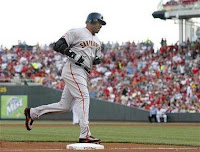Telecom as an industry suffered one of the largest slumps any industry has ever seen between 2000 and 2003, and really has only recently emerged from the massive over-investment of the 1990s.
Those that are now fond of claiming that somehow this enormous buildout was somehow worth it in the end, on balance, are wrong. The loss of financial investment is a sign that the market is not working (in this case it was quite overheated by 1999), not a sign that it is. Massive, inefficient allocation of resources is not worthwhile given the opportunity cost. Though an enormous amount of available long-haul capacity was built, it was just a minor side effect of some $1 trillion of financial losses, best exemplified by the bankrupt WorldCom and Global Crossing.
Recently the industry has seen a revival in fortunes. As Businessweek noted last month:
‘Over the past year, however, the telecom industry has roared back to life. Credit a steady rise in appetite for broadband Internet connections, which enable easy consumption of watch-my-cat video clips, iPod music files, and such Web-inspired services as free Internet phoning. Indeed, this year broadband adoption among U.S. adults is expected to cross the important threshold of 50%. Capital spending is on the rise as companies invest to build high-speed networks. Private equity players are placing enormous bets on the industry, such as the $8.2 billion that Silver Lake Partners and the Texas Pacific Group agreed to pay for networking gearmaker Avaya on June 5. And the glut in broadband communications capacity is all but gone.‘
But as much as the increase in dealmaking is a good augur, the iPhone’s cultural effect is probably even greater. Somehow, telecom has become very, very cool, and having the sleek, powerful iPhone has become an instant guarantor of status and attention.
Apple is really changing the telecom game, but not only by offering a much more open, web browser-based platform for applications than most cell phones along with the new design and materials including the shiny color touchscreen.
Building a device that has “Phone” in the name that does a lot of other useful tasks other than connect calls is a boon for telecom’s image. Apple is moving their platform, with all its cool, from unconnected or sometimes-connected devices like iPods or computers to the always-connected iPhone. Others will follow, and the network will continue to grow. It’s just hard to predict how long it will take. Welcome to the new connectedness.
[Read my and N. Rapp’s report on Apple from 2003.]











